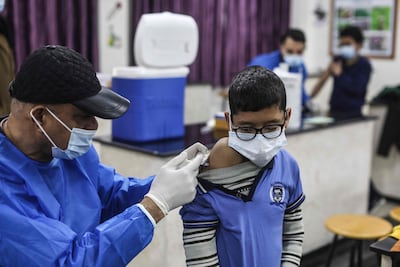The Middle East and North Africa is the only World Health Organisation region in which Covid-19 case numbers and deaths continue to rise since the beginning of the year because of lower vaccination rates, the organisation said on Wednesday.
Weekly case numbers increased by 36 per cent in the Eastern Mediterranean region, which includes 22 countries and territories stretching from Morocco to Pakistan, during the week of January 31 to February 6. The WHO said weekly deaths increased by 45 per cent.
“There has been a dramatic increase in the number of Covid-19 cases over the past six weeks, with a daily average of over 110,000 cases. A rise in deaths has also been reported over the past three weeks, with a daily average of 345 deaths,” Dr Ahmed Al Mandhari, WHO regional director for the Eastern Mediterranean, said in Cairo.
The five other WHO regions — Africa, the Americas, South-east Asia, Europe and Western Pacific — reported decreases in weekly cases this month.
Globally, the number of new Covid-19 cases decreased by 17 per cent compared with the number during the previous week, although the new seven-day death toll rose by 7 per cent.
Many of the countries that reported an early increase in the number of cases caused by the Omicron variant have reported declines in new infections since the beginning of January, the WHO said in its latest weekly epidemiological update.
The low vaccination rate in the Eastern Mediterranean region and a lack of adherence to public health and social measures have fuelled the increase in case numbers and deaths, WHO officials said at the Cairo briefing.
About 35 per cent of the region’s population of nearly 700 million people is now fully vaccinated, but the rates vary “enormously among countries, ranging from between 1 per cent and 94 per cent”, Dr Al Mandhari said.
Six countries in the region still have vaccination coverage of less than 10 per cent, far lower than the 40 per cent coverage target set by the WHO by the end of 2021.
“Even though before the end of the year, we had some shortage of vaccine supply, right now this is not the problem,” said Dr Rana Hajjeh, director of programme management at the WHO Regional Office for the Eastern Mediterranean (Emro). “All the countries have adequate vaccine supplies, but we need to mobilise the population.”
Improving vaccination coverage has to be combined with sticking to interventions, such as wearing masks, avoiding crowded areas and keeping places well ventilated, Dr Hajjeh said.
“The implementation of all of these has unfortunately been quite relaxed over the last few months, partly due to fatigue and various other factors,” she said.
Countries cannot rely on the concept of herd immunity, as Omicron has increased the level of reinfection among those who are vaccinated or recovered from Covid-19, said Dr Abdinasir Abubakar, manager for infectious hazards prevention at Emro.
“Omicron has changed the equation when it comes to herd immunity. There are countries where almost 80 per cent or 90 per cent of people have either been vaccinated or infected,” he said. “At the same time, we need to push vaccination coverage to minimise severe cases and deaths.”
The region has reported more than 19.8 million cases and more than 324,000 deaths.

In the first week of February, nine countries reported increases in new cases of 20 per cent or greater, with the highest relative increases reported from Iran, Afghanistan and Jordan. In Iran new cases increased by 188 per cent to more than 221,000.
Iran has vaccinated about 65 per cent of its population, while vaccination coverage in Jordan is about 40 per cent and in Afghanistan about 10 per cent.
In contrast, in the UAE, which has inoculated about 95 per cent of the population, cases have decreased in the past two weeks.
The highest number of new deaths were reported from Tunisia, Iran and Egypt. In Tunisia, where about half of the population is fully vaccinated, the 383 deaths represented a 39 per cent increase compared with the previous week.
An added challenge in the region is areas of conflict and the 21 million internally displaced people (IDPs), who account for 45 per cent of the total number of IDPs worldwide, Dr Al Mandhari said.
Dr Al Mandhari emphasised the importance of collective solidarity and action to help end the pandemic.
“It is up to all of us — as individuals and community members — to take actions that can and will determine the course of this pandemic and ensure that future generations are spared from what we are currently enduring,” he said.






























